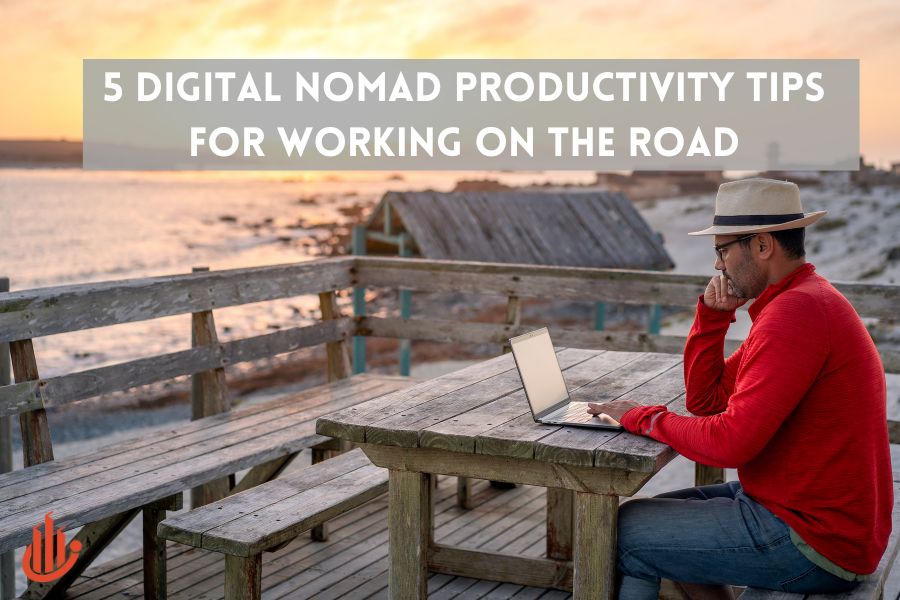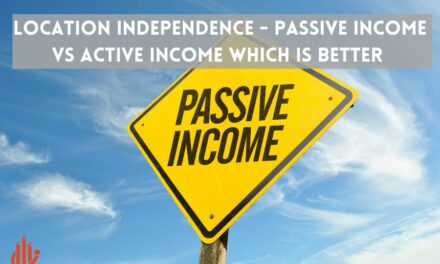When I first started working remotely, I faced a major challenge in maintaining my Digital Nomad productivity levels. Although the idea of being able to work from anywhere in the world was appealing, the reality was that I often found myself getting easily distracted, leading to a decrease in productivity.
The main issue was that whenever I arrived at a new destination, especially popular tourist spots, I would immediately switch to vacation mode. However, as many of you may already know, being in vacation mode is not conducive to earning a steady income.
If you want to sustain your location-independent income over a long period of time, it is crucial to ensure that you continue to prioritize work while travelling.
So how can you stay focused and get things done amidst countless distractions? Of course, the goal is not to spend all your time in an exotic location glued to your laptop for 10 hours a day. That defeats the purpose.
The key is to find a balance between productivity and enjoying the freedom and income that comes with working remotely. You need enough focus to produce high-quality work and meet your desired output, while still allowing yourself ample time to explore and enjoy your surroundings.
Based on my real-world experiences of working online while traveling, here are my top five Digital Nomad productivity tips.
1 – Plan Your Accommodation and Get More Done
One of the most crucial factors that significantly boosts my Digital Nomad productivity is having a quiet and reliable workspace. Without it, I struggle to complete my work effectively. While it may be tempting to book cheap hostel dorms to save money, especially if you’re not earning much online yet or you’re accustomed to budget backpacking, this can be a mistake.
In many cases, it’s actually more beneficial to book a private room or share accommodations with fellow nomads, if possible. The extra expense is outweighed by the additional work time and increased productivity.

Sharing Airbnb apartment with fellow Digital Nomads
If you’re like me, the social aspect of travelling is a significant reason why you do it. It’s all too easy to get caught up in partying every night and continually push aside your to-do list for another day. And then another day. And another.
For this reason, I highly recommend adapting your travel style if you’re attempting to maintain a steady income while on the road. Whether you like it or not, you’re no longer a carefree backpacker with zero responsibilities. As long as you have clients or customers, it’s essential to dedicate the necessary time to serve them properly.
That’s why I prefer to alternate between different strategies.
2 – Create Focus Blocks and Travel Time
Your ability to apply this method to your travel style will depend on your business to some extent. If you find yourself constantly dealing with emergencies and being tied to your email all day, it may be challenging to allocate your time in this way.
In such cases, it would be beneficial to focus on implementing better systems to reduce your involvement in day-to-day business management. A virtual assistant can be particularly helpful in this regard. However, let’s assume that you have a reasonable level of control over when you can complete your work.
Personally, I prefer not to approach each day in the same way as a typical worker would, where work is done during the day and the evening is left for other activities. When I am travelling, I want my time dedicated to exploring a specific location to be solely focused on travel. Travel should be travel, and work should be work.
Depending on your budget and whether you are travelling alone or with other remote workers, you may consider alternating between private rooms and hostel dorms.
Like the following example:
- A 3-day focus session offers a private room without any distractions, allowing for intense focus on work. Although the nightly rate is higher, this setup leads to a greater productivity output. THEN
- During your stay in a dorm for 3 days, you have the opportunity to socialize, explore your surroundings, fully immerse yourself in the experience, and save money on non-productive days.

The length of your trip will determine whether you need to make frequent changes or not. If you are staying in one place for an extended period with a monthly rental, you won’t have to switch locations like this. It offers a completely different experience compared to travelling to multiple countries.
In general, if you move at a slower pace, it becomes easier to maintain consistent habits for working on the road and ensure that your productivity levels remain comparable to those at home.
3 – Discipline Is needed while Working on the Road
Having a well-planned itinerary is important when travelling, but sometimes you have to be prepared for unexpected changes. The spontaneity and unpredictability of daily life during a trip can be thrilling and enjoyable.
For me, part of the adventure is being able to wake up and make impromptu decisions like booking a train or plane ticket without prior planning. The more structured a trip is, the less excitement it may bring. However, staying productive while on the road requires a great deal of discipline. It is not a path for those who are lazy or lack determination.
If you have ever worked from home, you know how challenging it can be to stay motivated. Just think about those times when you had homework that you really didn’t want to do. Now imagine experiencing that feeling while on a beach in Thailand, surrounded by people getting ready to party at bars and clubs. In such situations, it can be difficult to maintain discipline.
That’s where focus blocks can be helpful. By removing all distractions for a week or a few days, you can dedicate yourself to completing as much work as possible. Setting up your environment to be conducive to productivity can also reduce the amount of discipline required.

4 – Do Work You Enjoy
If you don’t enjoy your work, it becomes much more challenging to stay motivated. In such cases, it’s likely that you’ll opt for procrastination activities like getting $5 massages on the beach instead of focusing on your tasks.
Working on the road can help you identify which clients and projects you prefer and which ones you struggle with. This realization can also highlight a problem in your business, such as not having enough leads or work options. Consequently, you may find yourself accepting projects that aren’t your first choice. However, this can actually be a valuable filter to prioritize your work effectively.
By recognizing which types of clients or customers you should focus on acquiring, you can not only increase your income but also ensure that you spend a larger portion of your time on the road doing enjoyable work. Additionally, you’ll quickly discern which clients are more trouble than they’re worth.
Personally, when I’m working on the road, I prefer to work with fewer clients. My goal is not to maximize income but rather to cover my travel expenses while minimizing hassle and drama.
Moreover, working remotely allows you to distinguish between tasks you enjoy and tasks you’d prefer to delegate to someone else. If you find yourself wasting time on low-value tasks that you dislike, consider outsourcing them to increase productivity.
5 – Quiet and Alone vs Coworking & Team
When considering the ideal work environment, it is important to determine whether you prefer working alone without any distractions or alongside other remote workers and nomads. Co-working spaces have gained a lot of attention in recent years.
Personally, I do not favour co-working spaces as I find it challenging to concentrate and produce my best work when surrounded by people. Having others around often leads me to switch between distractions and engage in surface-level tasks that require minimal concentration, which ultimately hinders my productivity.
Fortunately, there are alternative options to working in coffee shops or co-working spaces. Personally, I find a private workspace in my accommodation to be much more preferable as it allows me to be alone and focus on my work.

Another possibility is to explore co-living arrangements with other remote workers or nomads. While I have not personally tried this, I can envision it as a positive environment, provided that the individuals involved are genuinely committed to their work. It is important to be cautious as there are individuals who may claim to be digital nomads but do not actually earn money online and instead rely on credit cards to fund their travels. Before entering a co-living situation, ensure that those involved are truly dedicated to their work and will not become additional distractions.





